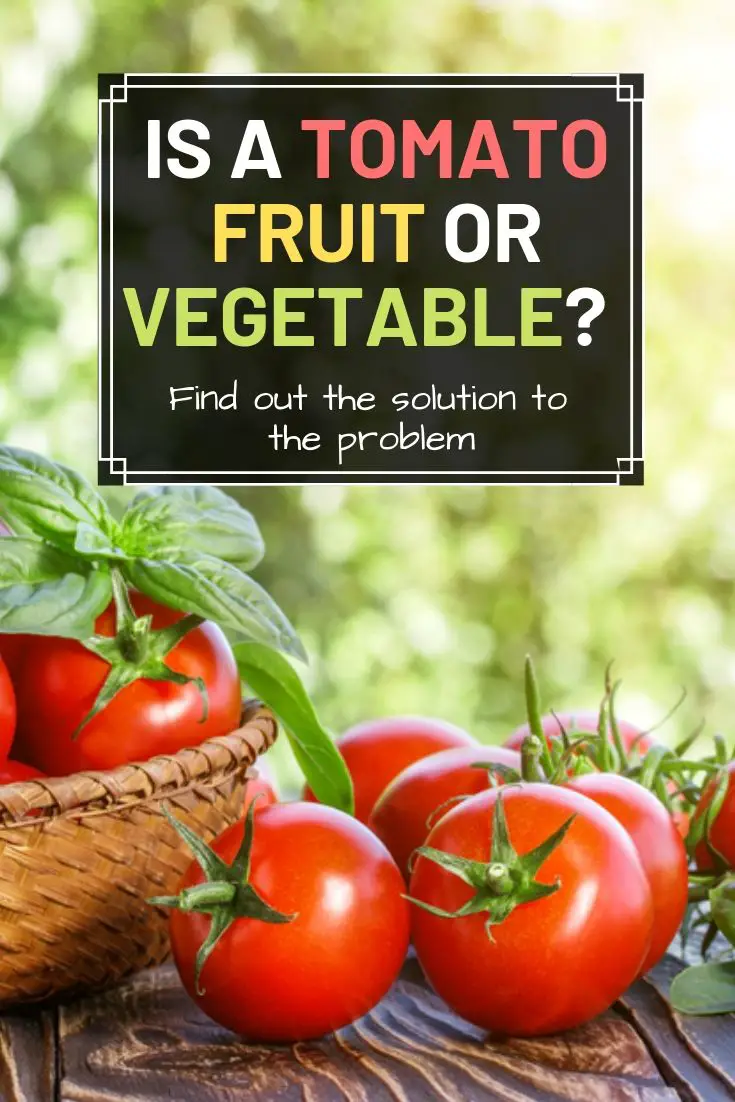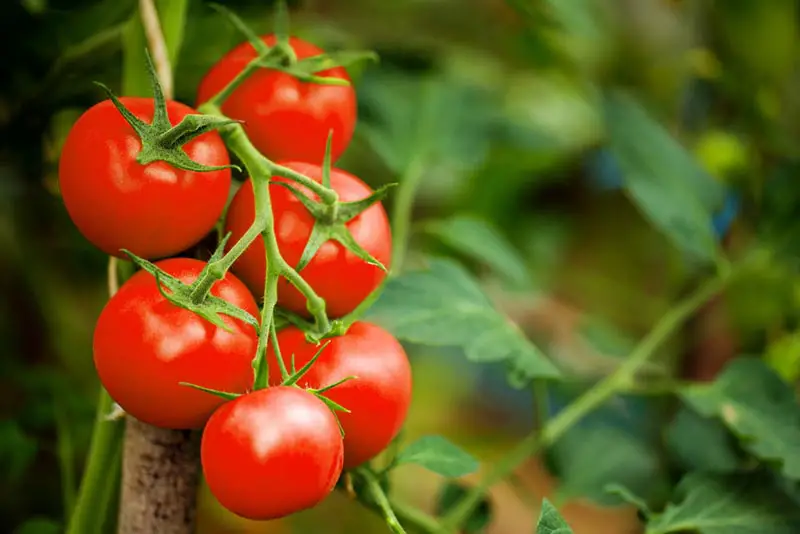Have you ever wondered why tomatoes are considered both a vegetable and a fruit? It’s one of those age-old debates that has been around for centuries, with people arguing whether a tomato is a vegetable or a fruit.
Tomatoes have been part of human diets since the days of ancient Aztecs, who used them in their cooking. Over the years, tomatoes have become an essential ingredient in many dishes, from salads to sauces. But despite their popularity, there is still no clear consensus on whether tomatoes should be classified as fruits or vegetables. So what’s the real answer?
We will take an in-depth look at the debate surrounding tomatoes and explore whether they are truly fruits or vegetables. With the help of experts, we’ll explore both sides of this argument and provide readers with reliable information about this much-debated topic.
Botanical Classification
From the botanical point of view, fruits consist of the germ cells of plants. On the other hand, vegetables consist of different plant parts, such as stems, leaves, or roots. So the answer to whether a tomato is a fruit or a vegetable is not very simple. Tomatoes are part of the family of fruit and vegetables. They are in the middle between fruits and vegetables. Fruits are fruits, that is, the edible parts of pollinated flowers.
As a rule, fruit plants are perennial. On the other hand, in the case of vegetables, other parts of the plant than the fruits are eaten. Vegetables are usually annual. In addition, they have significantly less sugar than, for example, apples or cherries. That is why tomatoes, zucchini, pumpkins, cucumbers, and aubergines are fruit vegetables.
The tomato does have one feature that sets it apart from other fruits: its texture. Tomatoes are firm and crunchy, unlike other fruits which tend to be much softer and juicier. This could explain why people don’t immediately think of tomatoes as being a fruit.
These factors further illustrate why tomatoes should be considered more than just vegetables – they are true powerhouses when it comes to nutrition!
Nutritional Characteristics
Moving on from botanical classification, it’s time to take a look at the nutritional characteristics of tomatoes. Tomatoes are considered to be a fruit, but they are often used as a vegetable due to their savory flavor profile. Nutritionally speaking, tomatoes are an excellent source of vitamins A and C, as well as dietary fiber and minerals such as iron and calcium.
Tomatoes also contain lycopene, a powerful antioxidant that can help protect against certain types of cancer. Studies have found that eating tomatoes regularly may also reduce the risk of heart disease and stroke. Additionally, they are low in calories and fat, making them an ideal choice for those looking to lose weight or maintain a healthy lifestyle.
Tomatoes make an excellent addition to any diet due to their high nutrient content and versatile flavor profile. Whether you’re adding them raw into salads or cooking them down into sauces, there’s no denying the numerous health benefits that tomatoes provide.
Historical Usage
Tomatoes have been considered both a fruit and a vegetable throughout history. In the early 1800s, tomatoes were classified as a vegetable due to their savory taste. This is because back then, fruits were mainly associated with sweet flavors. During this time, tomatoes were used in salads and other savory dishes.
In 1883, the Supreme Court of the United States ruled that tomatoes should be classified as vegetables for taxation purposes. This classification was based on their use in cooking rather than their botanical characteristics. As such, they weren’t taxed when imported from abroad like other fruits at that time.
Today, tomatoes are widely recognized as both a fruit and a vegetable due to their dual qualities and uses. They can be eaten raw or cooked in various ways depending on personal preference. Depending on how it’s prepared and served, tomatoes can be enjoyed as part of meals or snacks throughout the day.
Cultural
From a cultural point of view, you can see how we usually talk about tomatoes. Are we talking about tomatoes or fruits or vegetables? And how do we deal with tomatoes in everyday life? From a cultural point of view, we can consider tomatoes as vegetables. We call tomatoes more often than vegetables, more rarely than fruits. In the supermarket, tomatoes are usually found in the vegetable department, the other vegetables.
In horticulture, tomatoes are vegetables:
How does horticulture looks at the question, of whether tomatoes are fruits or vegetables? In horticulture, fruits, and vegetables are distinguished as follows:
- Everything that grows on herbaceous plants is vegetables.
- Everything that grows on woody plants is fruit.
In horticulture, the tomato is therefore considered a vegetable, not a fruit. Tomatoes grow on herbaceous plants and not on woody plants.
Another horticultural argument that tomatoes are vegetables, not fruits, is that tomatoes grow on a one-year-old plant. In vegetable growing, the plant dies after cultivation. This is also the case with tomatoes.
Botanically, the tomato is a fruit.
Both ‘fruits’ and ‘vegetables’ are not botanical names. “Fruit” always refers to a fruit or false fruit of a plant, while “vegetables” can refer to all edible parts of a plant. Botanically, fruits, flowers, leaves, and stems all belong to vegetables. In botany, tomatoes are best described as a fruit, not as a crop or vegetable.
Food Science: Tomatoes are vegetables
In the kitchen, a distinction is made between fruits and vegetables based on the time when they are eaten:
- Everything that is eaten as a starter or main dish is vegetables.
- Everything eaten as dessert is fruit.
Although you can eat tomatoes at any time of the day, we mostly use tomatoes for starters or main dishes. From the perspective of food science, tomatoes are therefore clearly vegetables.
Are tomatoes fruits or vegetables? The final answer.
As mentioned earlier, tomatoes are all about the healthy nutrients they offer, whether we call them fruits or vegetables. Above, you could read that you can view the discussion of whether tomatoes are fruit or vegetables from many angles. Therefore, a wonderful term for our delicious and healthy products was invented: fruit and vegetables!
The fruit vegetables are fruits and vegetables, which due to their growth characteristics and their taste, could not be classified exactly into one of the two groups. They are called fruit vegetables to solve the confusion between the two groups. In addition to tomatoes, the fruit and vegetables are listed below:
- Cucumbers
- Eggplant
- Melons
- Peppers
- Legumes
- Pumpkins
- Zucchinis
The above-mentioned fruits are often counted among the vegetable varieties but technically are not all vegetable forms, just as melons are not real fruits. Therefore, the generic term for the fruit vegetable has been developed to refer to fruits that are used as a vegetable variety or are actually one but are considered a fruit because of their sweetness.
Conclusion
Tomatoes are both a fruit and a vegetable. Depending on the context, they can be used with either label. They have a fairly long shelf life when stored properly, making them a great addition to any home garden. Eating tomatoes can provide some health benefits, but there are potential risks as well so it’s important to be aware of those before consuming them.
The flavor of tomatoes can vary depending on where they’re grown, so it’s important to try different varieties to find out which ones you like best. Preparing tomatoes for optimal flavor is also an important step in their consumption; it requires taking into consideration factors such as ripeness and texture.
All in all, tomatoes are incredibly versatile and can be used in a variety of dishes or eaten raw. Whether you consider them a fruit or vegetable, they make an excellent addition to any diet. With proper care and attention, you can enjoy their unique flavor and nutrition for years to come!
Also read :
Did you find this post useful? Would you like to get back to it later? Save THIS PIN below to your gardening, flowers, or house plant board on Pinterest! Thanks 🙂


